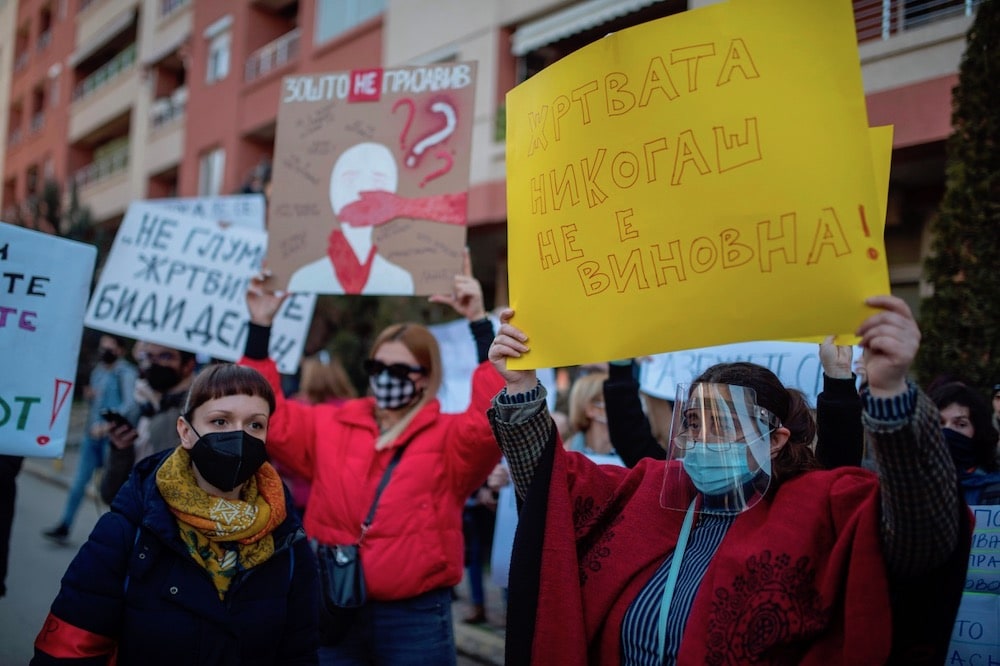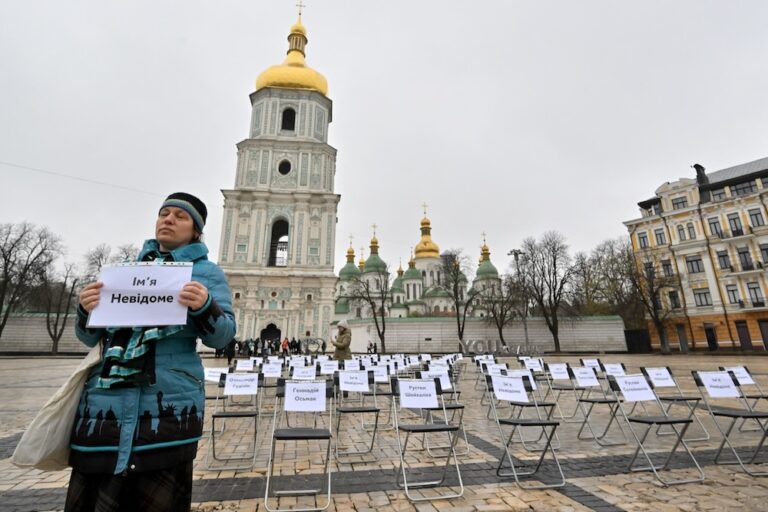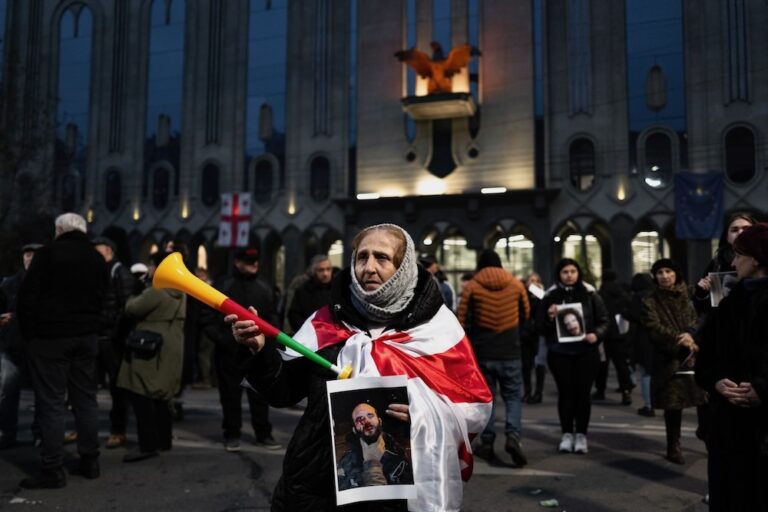February 2023 in Europe and Central Asia: A special feature on tackling online harassment of women journalists in North Macedonia plus the latest free expression news from the region, produced by IFEX's Regional Editor Cathal Sheerin.
A natural disaster worsens the free expression crisis in Turkey; Russia commits 497 attacks on the media in Ukraine; Raman Pratasevich goes on trial in Belarus; fighting online harassment of women journalists in North Macedonia.
“Double-victimisation:” Fighting online harassment of women journalists in North Macedonia
In February 2023, following two years of advocacy by civil society groups, sexual harassment – including online – was criminalised in North Macedonia. Ahead of International Women’s Day, IFEX spoke to Bojana Jovanovska, author of the report From Normalisation to Self-Censorship about the pervasiveness of the problem, how it affects women journalists in North Macedonia, and how it should be tackled.
Bojana Jovanovska is a researcher, feminist, and Project Coordinator for gender equality at the Helsinki Committee for Human Rights in Skopje, North Macedonia. The following Q&A was conducted by email.
Q&A
What is the impact of online gender violence on women journalists in North Macedonia?
In North Macedonia, the inferior position of women in the public sphere is very obvious, so any attempt to publicly voice women’s views and needs bounces off that matrix. The vulnerability of women journalists has increased with the development of online media: according to data from the survey I conducted for From Normalisation to Self-Censorship, over 80% of women journalists in North Macedonia have faced online harassment, most often provoked by articles they have written that criticise centres of power or the authorities, many coordinated attacks by people linked to political parties. For most women journalists, however, the harassment did not cause them to change their behaviour. Some even managed to ignore it – accepting it as part of the job – which suggests a worrying degree of normalisation of the problem.
“Over 80% of women journalists in North Macedonia have faced online harassment… Almost half of women journalists did not report their online harassment. Common to all victims is that they simply do not trust the institutions.”Bojana Jovanovska, Author, From Normalisation to Self-Censorship
What factors are driving this?
Gender-based violence (GBV) is quite widespread in the country, and the perception of violence as a common occurrence in our environment contributes to this. Patriarchal values still penetrate all spheres of our society, in which traditional gender roles and stereotypes are carefully nurtured. We also have gender insensitive institutions that do not act in a timely manner – or at all – in cases of GBV. All this leads us to one of the most serious problems we are facing: underreporting. It’s estimated that only 2% of women who have experienced violence in North Macedonia have reported it to the competent institutions. This problem was also reflected in the research: almost half of women journalists did not report their online harassment. Common to all victims is that they simply do not trust the institutions.
The digital space is still perceived as a relatively harmless space where anyone can say anything without repercussions. The ‘intangibility’ of that space has contributed to devaluing the seriousness of online violence – as something that exists and remains only in some virtual world – without taking into account its effects in the physical world. The legal framework regulating the online space is insufficient, but existing legislation is also inadequately implemented. The only institution responsible for online cases – the Cybercrime and Digital Forensics Department – lacks resources and therefore is completely inefficient.
What are the biggest challenges to effectively tackling the problem of gender violence online in North Macedonia?
The biggest challenge is inert institutions, reinforced by a double-victimisation that discourages women from reporting this violence. One case that illustrates the problem of sexual harassment online was the scandal known as ‘Public Room’, which surfaced in 2020. It showed the low capacity and lack of institutional will to address such cases, and also the lack of appropriate legislation.
In the ‘Public Room’ case, explicit photos and videos of girls and women – and also private information such as telephone numbers, addresses and social media profiles – were shared on a Telegram chat group without their consent. Some of the photographs in the group had been downloaded from victims’ open profiles on social media, but many were sent in private, probably to intimate partners, and were then shared with the group (members of which were exclusively men). As a result, victims were harassed via private messages – which included sexual content – and phone calls from unknown men. We, as part of the Platform for Gender Equality, organised several protests over the authorities’ slow response and the existing gaps in legislation.
Although sexual harassment online was finally criminalised in February, that does not mean the law will be implemented appropriately.
What’s the connection between North Macedonia’s online disinformation problem and gender violence online?
Online disinformation has contributed considerably to the rise of the anti-gender movement, presenting a threat to what has been achieved so far for gender equality. The anti-gender movement appeared in North Macedonia at the end of 2020, when the government launched primary school reforms that included the introduction of gender-sensitive, inclusive, and comprehensive sex education. The movement mainly uses social media, especially Facebook, where they spread disinformation, provoke fear and panic among the public, and strongly advocate against the reforms they say will ‘sexualise’ children. This narrative has led to increased online harassment of women’s rights activists, and even to death threats.
“Online disinformation has contributed considerably to the rise of the anti-gender movement, presenting a threat to what has been achieved so far for gender equality.” Bojana Jovanovska, Author, From Normalisation to Self-Censorship
Is there a solution to the problem of online violence?
We advocate for a systemic solution in addressing online violence, starting with its criminalisation. It must be recognised by institutions, which should effectively deal with cases in a timely manner. Media outlets should also provide adequate support and protection for women journalists facing this type of violence – monitoring and intervening when disturbing comments are made in relation to online content.
How has your research impacted you?
I was stunned by the bravery of women in journalism and once again deeply disappointed by the system. Unfortunately, on a couple of occasions I have found myself, especially during the ‘Public Room’ period, adjusting my online behaviour and even self-censoring regarding the content I shared. I cannot say that I feel very optimistic about the effectiveness of our institutions to tackle this problem, but I can say that we will stay very vocal about it.
Stay informed: Visit IFEX’s Gender and Sexual Diversity hub page.
February: Europe & Central Asia in brief
Free expression threatened during natural and man-made disasters
One year of human rights violations
IFEX members marked the one-year anniversary of Russia’s invasion of Ukraine by highlighting the devastating impact of President Putin’s aggression on independent media and civil society in both countries.
Several writers and press freedom groups joined PEN America in an open letter expressing solidarity with the Ukrainian people and calling for Russia to be held accountable for its war crimes and human rights violations.
The partner organisations of the Council of Europe’s Safety of Journalists Platform issued a statement remembering those who had been killed during the conflict and calling for media freedom to be protected and respected.
Our regional colleagues at the Institute of Mass Information (IMI) published their monthly update of Russia’s attacks on media in Ukraine. According to IMI, Russian forces attacked the press 497 times in the year to 24 February 2023. These attacks include killings, woundings and abductions of journalists, shellings of offices, death threats and cyber attacks. A shocking 233 media outlets have also been forced to close due to Russia’s invasion.
Statistics published by the International Press Institute (IPI) showed the war’s effect on the press in both countries. The IPI Ukraine War Press Freedom Tracker has recorded over 900 attacks or threats against media in Russia and Ukraine since the invasion began, with 610 of these violations occurring inside Russia.
Human Rights Watch looked back on a year of war from a broader rights perspective, publishing a report on 12 of Russia’s worst human rights violations in Ukraine.
February also saw Russia continue to provide fresh evidence of the authorities’ intolerance of anti-war dissent: journalist Alexander Nevzorov was sentenced in absentia to eight years in prison, and journalist Maria Ponomarenko was sentenced to six years – both for allegedly spreading “false information” about the Russian armed forces.
A natural disaster worsens a free expression crisis
The devastating earthquakes that hit southeastern Turkey in early February resulted in the loss of at least 44,000 lives. Faced with such a disaster, the Turkish authorities did what they so often do in a crisis: they opted for limiting free expression and tried to prevent the independent press from carrying out its essential role of keeping the public informed.
An IPI statement lists some of the Turkish authorities’ most draconian responses in the first few days following the earthquakes. These include: a warning issued by the chair of Turkey’s Radio and Television Supreme Council (RTÜK) that the media had a legal obligation not to cause panic or spread disinformation; a threat from President Erdoğan – while he declared a three-month state of emergency in the affected areas – to punish those who spread disinformation about the earthquakes; the detention of several journalists as they attempted to report on the aftermath; and a temporary throttling of social media.
Many journalists were attacked by police and members of the public while they tried to report on the disaster. RTÜK fined three broadcasters for their critical coverage of the government’s emergency response.
Social media users were also targeted: by 23 February, the police had initiated legal action against 559 individuals in relation to their social media activities following the earthquakes; 138 users were detained and 27 arrested for allegedly “provocative” posts.
Unrelated to the earthquakes, the authorities continued to crack down on Kurdish journalists’ and writers’ free expression: ten journalists – nine of whom have been under pre-trial arrest since October – were indicted on terrorism charges and face up to 15 years in prison if found guilty; three Kurdish-focused websites (two news sites and one publisher) were banned for alleged “terrorist propaganda”.
High profile trials and heavy sentences
The persecution of independent voices in Belarus continued in February.
The final arguments were heard in the bogus trial of Nobel Prize winner Ales Bialiatski and his two Viasna colleagues, with prosecutors demanding heavy prison sentences for each of them. The three defendants are dubiously accused of smuggling and financing acts that violate the public order; a verdict was expected on 3 March.
February also saw the beginning of another high-profile trial: that of NEXTA journalists Raman Pratasevich, Stsypan Putsila and Yan Rudzik. Although the latter two are being tried in absentia, Pratasevich is facing trial in person following many months of house arrest and various televised forced ‘confessions’. The three men each face more than ten separate charges relating to their media activities and opposition activism, and will receive long prison sentences if convicted.
Several heavy prison sentences were handed down this month. Journalist Andrzej Poczobut received eight years; editor Yury Hladchuk received 2.5 years; and two so-called ‘rail guerrillas’, Dzmitryi Klimau and Uladzimir Auramtsau, each received 22 years after they were convicted of destroying railway equipment in order to disrupt the movement of Russian military equipment in Belarus.
Mid-month, IFEX joined civil society organisations in urging the UN Human Rights council to establish an independent investigative mechanism in order to better hold President Lukashenka’s regime to account for its serious, ongoing human rights violations.



